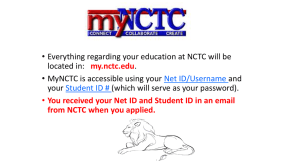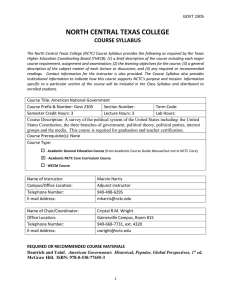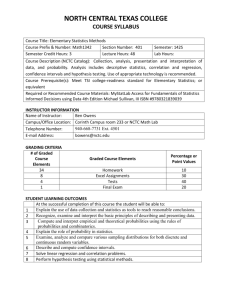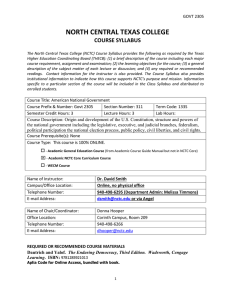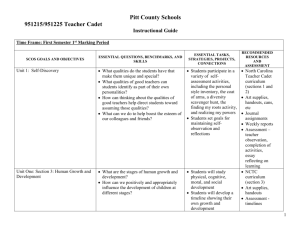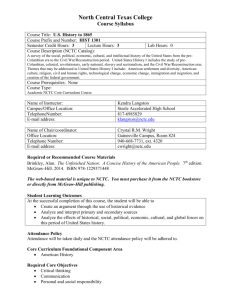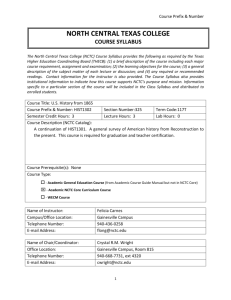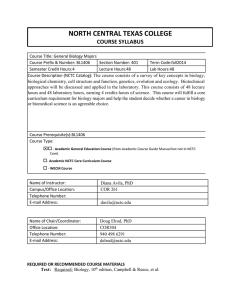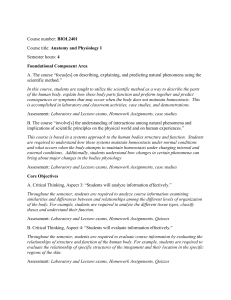course syllabus - North Central Texas College
advertisement
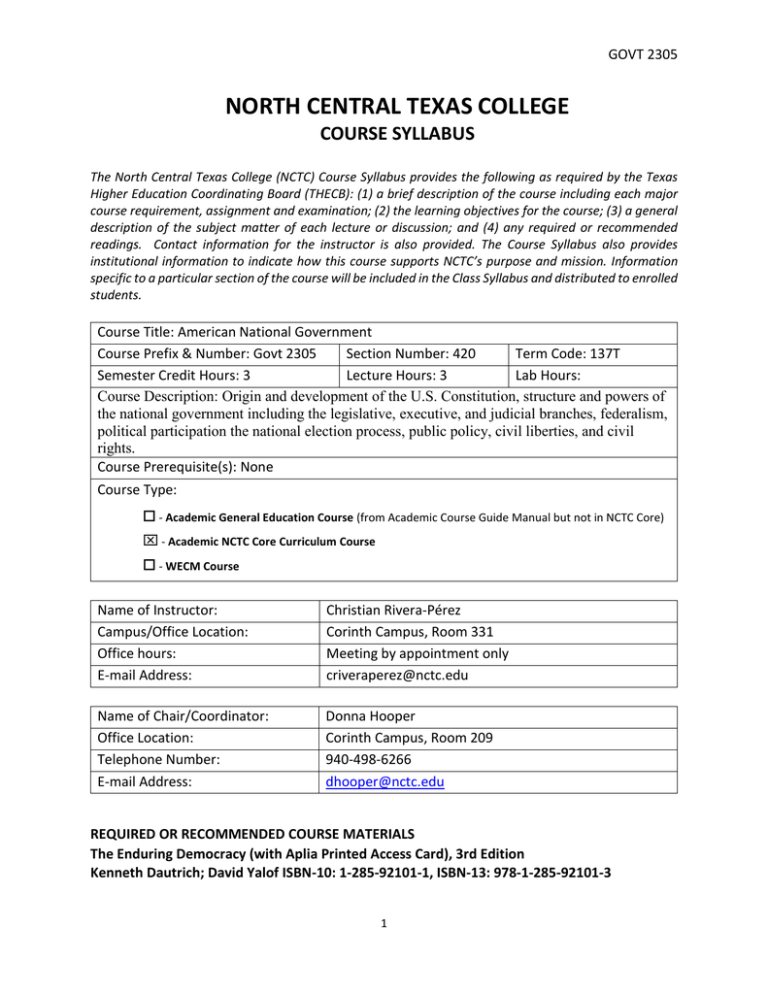
GOVT 2305 NORTH CENTRAL TEXAS COLLEGE COURSE SYLLABUS The North Central Texas College (NCTC) Course Syllabus provides the following as required by the Texas Higher Education Coordinating Board (THECB): (1) a brief description of the course including each major course requirement, assignment and examination; (2) the learning objectives for the course; (3) a general description of the subject matter of each lecture or discussion; and (4) any required or recommended readings. Contact information for the instructor is also provided. The Course Syllabus also provides institutional information to indicate how this course supports NCTC’s purpose and mission. Information specific to a particular section of the course will be included in the Class Syllabus and distributed to enrolled students. Course Title: American National Government Course Prefix & Number: Govt 2305 Section Number: 420 Term Code: 137T Semester Credit Hours: 3 Lecture Hours: 3 Lab Hours: Course Description: Origin and development of the U.S. Constitution, structure and powers of the national government including the legislative, executive, and judicial branches, federalism, political participation the national election process, public policy, civil liberties, and civil rights. Course Prerequisite(s): None Course Type: - Academic General Education Course (from Academic Course Guide Manual but not in NCTC Core) - Academic NCTC Core Curriculum Course - WECM Course Name of Instructor: Campus/Office Location: Office hours: E-mail Address: Christian Rivera-Pérez Corinth Campus, Room 331 Meeting by appointment only criveraperez@nctc.edu Name of Chair/Coordinator: Office Location: Telephone Number: E-mail Address: Donna Hooper Corinth Campus, Room 209 940-498-6266 dhooper@nctc.edu REQUIRED OR RECOMMENDED COURSE MATERIALS The Enduring Democracy (with Aplia Printed Access Card), 3rd Edition Kenneth Dautrich; David Yalof ISBN-10: 1-285-92101-1, ISBN-13: 978-1-285-92101-3 1 GOVT 2305 Students have many options to secure the text book. The text is available in the NCTC bookstore for purchase or rental. Students can also go directly to www.cengagebrain.com for additional purchasing options (cheaper?). COURSE REQUIREMENTS, EVALUATION METHODS AND GRADING CRITERIA # of Graded Course Elements 3 1 3 1 1 17 Graded Course Elements Test Final Test Assignments Annotated Bibliography POTUS Policy Memo Aplia Quizzes Percentage or Points Values 180 100 60 60 100 100 Total 600 points GRADE SCALE 600-540: 539-480: 479-420: 419-360: Less than 349: A B C D F Major Exams There will be four (4) major exams covering the material assigned from the textbook, lectures and discussions. These exams will be all objective and taken in class or online. The examinations will consist of multiple choice questions. Scantrons are required if test is taken in the classroom. On test day, no one will be allowed in the classroom after 30 minutes of the starting time. If a person comes 30 minutes late or more, it would be consider as a missed test. Online test that are missed would not be subject to a makeover! If you miss an in-class test, there will be an automatic 15 percent deduction on the makeup examination. If you know you will be gone in advance, you NEED TO TAKE THE EXAM EARLY! Exams need to be made up within one (1) week. The final CANNOT be made up! Assignments You will have a total of four (4) assignments. These assignments will focus on politics and government at the national levels and on economic and social events that impact the political system. You will earn points (100 points maximum) by writing a brief 500 words double-spaced type-written paper. Each assignment will have its own purpose described in detail on Angel. 2 GOVT 2305 POTUS Policy Memo This project is an opportunity to discuss what you think should be the highest priority (national interest) in the future of American policy. The assignment is worth 100 points. There are four steps to completing this project: Step 1: Identify the issue and how the US government is currently addressing it. Then, identify strategies that could be used to improve those efforts. Step 2: Gather two scholarly research peer-reviewed articles that address the issue you selected. Step 3: Submit an Annotated Bibliography (Worth 60 points) of the two scholarly research peer-reviewed articles you are planning to use for the Policy Memo. Each bibliography must summarize and assess the articles selected. Please visit http://owl.english.purdue.edu/owl/resource/614/01/ for additional information. Step 4: Prepare a formal policy memo for the President of the United States (POTUS). The grading standards used to assess the quality of your work for this project will be detailed in a grading rubric, which will be provided during the semester. More information will be provided on Angel. Aplia Assignments/Quizzes These assignments are online quizzes that must be completed prior to coming to class. The quizzes will help ensure you are doing the readings for the class but also will help you for the tests. More information will be provided during class and on ANGEL. * These Assignments are subject to change to best fit the schedule. * You will ALWAYS have a week notice on exams. * Make-up Exams DO NOT receive any additional points Note: 1. Attendance Policy. Attendance is vital in order to successfully complete the course. There will be no excused absences. You are granted 3 absences for the entire summer session (no points will be deducted). After your third absence, you will lose 2 points for every absence! 2. Academic dishonesty. Cheating in any form will not be tolerated. If the instructor determines that a student is not responsible for his/her work, no credit will be given for the assignment/test. Also, the instructor reserve the right to submit your information to the Government Department. 3. Rounding grades: Instructor reserves the right to round any or all grades. 3 GOVT 2305 Bottom Line: Course Calendar Week 1 Week 2 Week 3 Week 4 Week 5 July 7 Syllabus & Chapter 1: The More Things Change … July 8 Ch 2 The Founding and the Constitution July 9 July 10 July 11 July 14 July 15 July 16 July 17 July 18 July 21 July 22 July 23 July 24 July 25 July 28 July 29 July 30 July 31 August 1 August 4 August 5 August 6 August 7 Ch 3 Federalism Ch 4 Civil Liberties… No Class Ch 5 Civil Rights, Equality and Social Movements Test Review/Test Ch 6 Congress Ch 7 The Presidency, No Class Ch 8 The Federal Bureaucracy Ch 9 The Judiciary/ Test Review Ch 10 Public Opinion Ch 11 Interest Groups No Class Ch 12 The Media and American Politics Ch 13 Political Parties and Voting Ch 14 Campaigns and Elections Test Review/Test No Class Ch 15 American Domestic Policy Ch 16 American Foreign Policy Test Review In the classroom @ 9:30 A.M. Assignment 1 (Online) Aplia Quizzes (Ch. 1-5) Exam I (1,2,3,4,5) Annotated Bibliography (Online) Aplia Quizzes (Ch. 6-9) Exam II (6,7,8,9) Assignment 2 (Online) Aplia Quizzes (Ch. 10-14 Exam III (10,11,12,13,14) Assignment 3 (Online) Aplia Quizzes (Ch. 15 & 16) POTUS Policy Memo (Nov. 28th) Final Comprehensive 1. This is your class. You gain what you contribute. Make your investment pay off. 2. Your responsibilities are to study, attend class, limit absences and tardies, pass, and if necessary, drop the course. 3. You are encouraged to see or contact me at any time! 4. The uses of other electronic devices are welcome for class purposes only! 5. Finally, your instructor has the right to add, delete, revise, or otherwise change any or all segments of this course or syllabus. INSTITUTIONAL LEARNING GOALS A quality general education curriculum in all associate degree programs. 4 GOVT 2305 Quality freshman and sophomore level courses in arts and sciences which parallel the lower division offerings of four-year colleges and universities. Quality technical programs leading directly to careers in semi-skilled and skilled occupations, and quality technical education programs up to two years in length leading to certificates and associate degrees. Quality programs and services in support of adult literacy and basic skills development as a mean of workforce enhancement and expanding access to higher education. PROGRAM PURPOSE STATEMENT NCTC seeks to implement its goal of offering quality general education curriculum in all associate degrees by offering a core of general education courses designed to help students achieve academic, career and lifelong goals. Acquiring knowledge, thinking critically, and utilizing the methodologies of various disciplines exposed students to experiences that serve to advance their personal growth. The chief focus of the General Education Core Curriculum at NCTC is to emphasize Exemplary Educational Objectives and Basic Intellectual Competencies. DEPARTMENTAL PURPOSE STATEMENT The NCTC Social Science Department of Government and Economics provides students at NCTC a strong foundation in the liberal arts that is essential for career success, leadership, global citizenship, and a lifetime of learning. The department provides students with a broad knowledge and understanding of the world; significant intellectual, critical thinking and practical skills; and a strong sense of civic responsibility for enriching their lives and making a difference in society. STATEMENT OF SKILLS AND KNOWLEDGE EXPECTED OF NCTC GRADUATES NCTC seeks to implement its goal of offering a core of general education courses designed to help students achieve academic, career and lifelong goals. The chief focus of the General Education Core Courses at NCTC is to emphasize basic intellectual competencies and broad intellectual perspectives. FOUNDATION COMPONENT AREA 1. The course “focus[es] on consideration of the Constitution of the United States and the constitutions of the states, with special emphasis on that of Texas.” 2. The course “involve[s] the analysis of governmental institutions, political behavior, civic engagement, and their political and philosophical foundations.” GOVERNMENT CORE OBJECTIVES 5 GOVT 2305 Critical Thinking Skills to include creative thinking, innovation, inquiry, and analysis, evaluation and synthesis of information Communication Skills to include effective development, interpretation and expression of ideas through written, oral and visual communication Empirical and Quantitative Skills to include the manipulation and analysis of numerical data or observable facts resulting in informed conclusions Social Responsibility to include intercultural competence, knowledge of civic responsibility, and the ability to engage effectively in regional, national, and global communities. Personal Responsibility to include the ability to connect choices, actions and consequences to ethical decisionmaking; STUDENT LEARNING OUTCOMES Explain the origin and development of constitutional democracy in the United States. Demonstrate an understanding of our federal system. Describe separation of powers and checks and balances in both theory and practice. Demonstrate knowledge of the legislative, executive, and judicial branches of the federal government. Evaluate the role of public opinion, interest groups, and political parties in the political system. Analyze the election process. Describe the rights and responsibilities of citizens. Analyze issues and policies in U.S. politics. Research and compose an essay assignment/argument using proper grammar/English and basic computer skills. GENERAL DESCRIPTION OF SUBJECT MATTER FOR EACH LECTURE/DISCUSSION Topic General Description of Subject Matter Perspectives & theories of Freedom; order & equality; differing ideologies & forms American Govt of democracy The Founding & the Constitution Growth and development of America’s political system from colonization to present Federalism Ideology and structures of federalism; Key features of the Constitution: Republicanism, Federalism, Separation 6 GOVT 2305 Rights and Liberties Policy Making Institutions The American Political Landscape Campaigns and Elections Media and Politics Political Parties & Interest Groups Politics of National Policy of Powers, and Checks & Balances; Role/Limits of the States Differentiate between Civil Liberties and Civil Rights; Protections within the US Constitution, Bill of Rights and additional amendments; role of the judiciary The powers, responsibilities and organization of all three branches of government; role and scope of bureaucracy in our federal government; Public opinion, values & socialization; the growth of social policy within the US Growth of voting rights; participation; history and forms of voting; nominations, campaigns and elections; electoral college; campaign finance limitations Various forms of mass media & bias; effects on government and social policy Development of political parties in America; role of Interest Groups; campaign finance and assistance; affects of each on the political and policy-making process Economic policy: budgeting, funding sources & expenditures; Role and powers of the Legislative and Executive Branch in Domestic and Foreign Policy; National security and Defense; US involvement in world affairs Last day to Withdraw For the Summer II 2014 semester, the last day to withdraw from a course with a “W” is August 2, 2014. Student Rights & Responsibilities Scholastic Integrity NCTC Board policy FLB (Local) Student Rights and Responsibilities states that each student shall be charged with notice and knowledge of the contents and provisions of the rules and regulations concerning student conduct. These rules and regulations are published in the Student Handbook published in conjunction with the College Catalog. All students shall obey the law, show respect for properly constituted authority, and observe correct standards of conduct. Scholastic dishonesty shall constitute a violation of college rules and regulations and is punishable as prescribed by Board policies. Scholastic dishonesty shall include, but not be limited to cheating on a test, plagiarism, and collusion. STUDENT SUPPORT SERVICES 7 GOVT 2305 Office for Students with Disabilities (OSD) provides accommodations for students who have a documented disability. A disability is anything that can interfere with learning, such as a learning disability, psychological challenge, physical illness or injury. Accommodations may include extra time on tests, tests in a distraction reduced environment, volunteer note taker in class, etc. On the Corinth Campus, go to room 170 or call 940-498-6207. On the Gainesville Campus, go to room 110 in the Administration (100) Building or call 940-668-4209. Students on the Bowie, Graham, Flower Mound, and online campuses should call 940-668-4209 to arrange for an intake appointment with OSD. North Central Texas College is on record as being committed to both the spirit and letter of federal equal opportunity legislation, including the Americans with Disabilities Act (ADA) of 1990, ADA Amendments Act of 2009, and Section 504 of the Rehabilitation Act of 1973 (P.L. 93112). Financial Aid Office is responsible for administering a variety of programs for students who need assistance in financing their education. The first step for financial aid is to complete a FAFSA. For more information, please visit your nearest Financial Aid Office. Student Success Center is designed to help all students at NCTC develop tools to achieve their academic goals. The center links students to FREE tutoring, including a Writing Center, a Math Lab, and free online tutoring in the evening. The program helps students acclimate to college by providing students free interactive workshops about Time Management, Study Skills, Test Anxiety, and much more. For more information, please visit your nearest Student Success Center. As of January 1, 2012, all campuses of North Central Texas College are tobacco-free. NCTC is committed to providing a safe and healthy environment for its employees, students and visitors. As a result of becoming a tobacco-free campus NCTC will restrict the use of any and all tobacco products at all NCTC campus. Click Clear in the Air for complete details. 8
